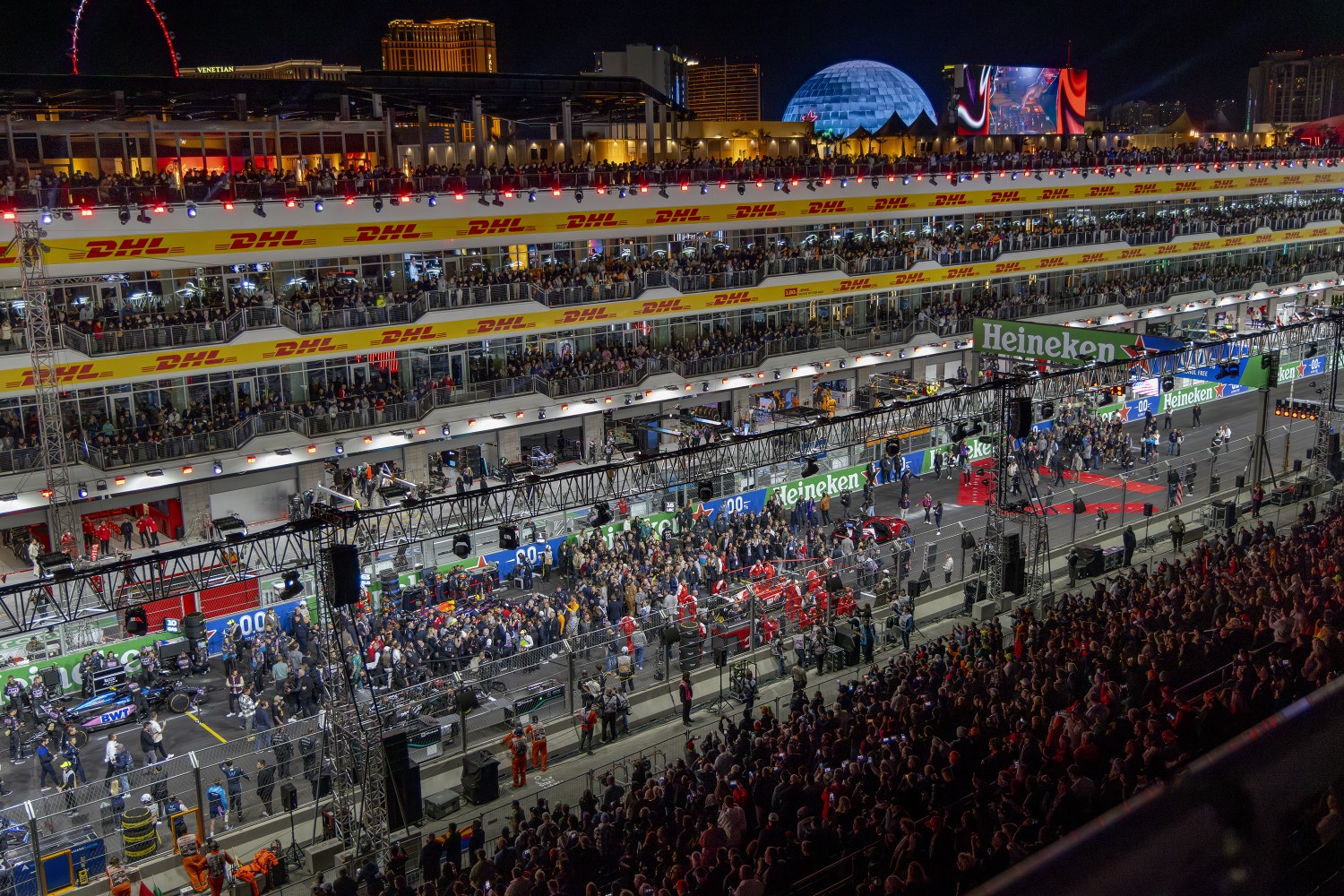F1 News: 2024 Las Vegas GP added almost $1B in revenue to city (Update)
(GMM) Formula 1 owner Liberty Media admits it is “disappointed” about the financial numbers coming out of its crown jewel event, the Las Vegas GP.
Overall, the sport’s popularity is surging, with Sky Deutschland boasting about soaring numbers in exciting new mainstream demographics.
“We have more than doubled the numbers in the target group of 14 to 29,” sports editor-in-chief Alexander Rosner told SID news agency. “And we now have three times as many female viewers.”
However, Liberty Media’s stock price actually fell by over 5 percent in the last period, which chief financial officer Brian Wendling attributes solely to the Las Vegas GP.
“We can’t comment on the specifics,” he said, “but the majority of the miss that you guys are calculating based on the team payment was Vegas-related.”
Liberty Media’s new CEO Derek Chang agrees.
“I think we all here were disappointed by some of the financial metrics in the early going here,” he said.

Las Vegas joined the F1 calendar in 2023, in a highly unique event for F1 as it is actually promoted by Liberty Media – with the paddock and pitlane sitting on land the sport’s commercial rights holder itself owns.
CEO Chang says the race has so far “missed internal expectations on revenue”, but explains that executives have already enacted “changes that will benefit 2025 and support a financially successful race for F1”.
“We now have two years of real data to understand what tickets and products sold well, the demographics of the fan base and the overall cost structure of the event,” he added.
“We have a clear handle on near-term priorities for Vegas to improve and we are confident in the value it provides.”
Wendling said the biggest problem for the event last year was slow ticket sales, after Liberty Media set prices at high levels never before seen in F1 history.
He also admitted there had been “softness” in “certain hospitality offerings”.
F1 CEO Stefano Domenicali says the sport remains committed to its Vegas project.
“As have always said, this is an incredible grand prix on which we need to keep working and make sure that it will stay as we believe at the top of the range,” said the Italian.
“We need to make sure that we focus our attention on the cost structure of the situation that we have to manage in Vegas. We also need to have even a better local relationship because that’s the key of the success.”
March 5, 2025
The second annual economic impact report for the Formula 1 Las Vegas Grand Prix has been released and last year’s race added almost $1 billion to the Las Vegas economy.
Editor’s Note: By Comparison, last weekend’s IndyCar race in St. Petersburg added a measly $60 million to the local economy. That number is inflated because the report says 165,000 attended the race on Sunday – the real number was a small fraction of that
Figures published in the Las Vegas GP’s economic impact analysis showed the contest is the largest recurring event in Las Vegas with a race week attendance of 306,000, of which 175,000 were from out-of-town.
Related Article: F1 News: 2024 Las Vegas GP was a huge success, nothing like it
Applied Analysis, a Nevada-based data research firm, reported a $934 million economic impact resulting from F1 in 2024. For comparison, the inaugural event in 2023 kicked off with a larger impact approaching $1.5 billion, according a report presented by Clark County last year.

Once race week hit in November 2024, F1 said they saw a net visitor spending amount of about $336 million, with a total economic impact of $556 million when you apply spending from sources like other businesses and employees. By comparison to 2023, net visitor spending was $501 million with a total impact of $884 million.
F1 said visitor spending supported leisure and hospitality businesses the most, but this also rippled through the local economy and supported neighborhood businesses like grocery stores, medical facilities and auto shops when employees spent their wages.
The executive summary (see below) said: “The combination of overall visitor spending and F1 investments into infrastructure and event operations during 2024 generated $934million in economic activity throughout the Southern Nevada community.
“The economic impact of event-specific visitor spending totalled $556m. Visitors that traveled to Las Vegas and attended the event stayed 3.7 nights on average and spent more than $2400 on non-race-related expenditures, including hotel rooms, food and beverage, local transportation, shopping, gambling and entertainment.
“To be clear, the $2400 per visitor does not include the cost of Las Vegas Grand Prix tickets; rather, it reflects the direct economic benefits to Las Vegas from visitor expenditures outside the race itself.”
lvgp-2024-economic-impact-final
